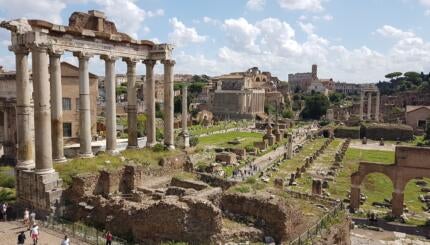At my childhood Passover seder, my mother would announce that she had made a donation to a food bank in honor of each guest. She explained that she began this annual practice since today we cannot open our doors directly to the poor. I always imagined this to be a wonderful example of caring for the wider world, never once questioning the assumption — and the lesson I was learning — that we cannot actually open our doors directly. Why not? Why couldn’t we invite someone hungry to come and eat at our table with us?
It turns out that resistance to opening the door is as ancient as the mandate itself. We learn both within two lines of each other in the same page of Talmud on Taanit 20a. A recounting of the wonderful behaviors of a scholar named Rav Huna ends with a description of his practice to open the door for the hungry: “When [Rav Huna] would eat bread, he would open the doors saying: ‘Whoever needs, let him come in and eat.’” Rav Huna’s behavior becomes our model. The Haggadah features his invitation almost word for word as we open our seders: “This is the bread of affliction that our ancestors ate in the land of Egypt. Let all who are hungry come and eat.”
We are meant to imitate Rav Huna and invite the hungry into our homes, but we encounter resistance to this idea in very next line of the Talmud: “Rava said: ‘I can fulfill all these [customs of Rav Huna] except for this one, which I cannot do, due to the many soldiers in Mehoza.’” Rashi explains Rava’s concern: There are so many poor people that they would eat all the food. No sooner does the Talmud present us with the open-door model than someone explains that it cannot really be done.
Our fear of opening our homes to the hungry is not new. The impulse to keep the door closed is ancient, and it comes even from a great sage like Rava. Today there are many reasons we might not literally open our doors to welcome anyone who wishes to join our tables. According to the Food Bank for New York City, 1.1 million city residents — or 12.5 percent of its population — are food insecure. The number of hungry people is overwhelming. Like Rava in Mehoza, I cannot invite them all to dinner.
With your help, My Jewish Learning can provide endless opportunities for learning, connection and discovery.
At today’s seder, we customarily don’t open our doors while reciting the invitation to the hungry, but we do open the door at a different point in the evening — near the end when we pour a cup for Elijah. Why open the door to welcome the prophet Elijah so long after the plates have been cleared? A commentary from the Maaseh Rokeah (12th-13th century Germany) offers a different reason to keep an open door: “This is our custom: that the doors of the house should remain open, so that when Elijah comes, we will speedily go out to meet him without any delay, for on Passover Israel will be redeemed in the future.”
The Maaseh Rokeah is preparing for another moment of redemption, one that is coming soon, maybe even tonight. We know from the biblical book of Malachi — the passage from the prophets read this week on the Shabbat prior to Passover — that Elijah is the prophet who will come to announce the final redemption. The Maaseh Rokeah keeps the door open on seder night not to let others in, but to ensure the people inside can get out. His custom imagines that when Elijah comes to announce the redemption, there will be no time to waste. The open doors remind us, and the prophet, that we are ready and eager to be redeemed.
Taken together, these two customs have an important lesson to teach. The closed door that keeps out the hungry may also be holding us back from redemption. The seder traditions teach us that Passover is a time for open doors. Only when we are ready to open our doors to the hungry — when we have addressed the systemic hunger outside to a point where all who are hungry really do have a seat at the table — will we really be open to redemption. May it come speedily in our days.
This article initially appeared in My Jewish Learning’s Shabbat newsletter Recharge on Apr. 1, 2023. To sign up to receive Recharge each week in your inbox, click here.



